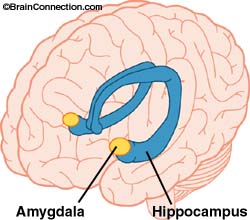Take home message
XMRV inserts into CREB genes causing insertional mutagenesis.
In simple terms that means that it can change the activity of the gene and a change in the nature and function of the proteins made.
CREB protects neurons within the amgydala.Down regulation can cause excessive neural death in the Amgydala(this is the responsible for regulating levels of anxiety ).
Excessive cell death causes hyperanxiety states and paradoxically depression.
So could XMRV cause anxiety and depression hypothetically yes
Clin Invest. 2005 October 1; 115(10): 26972699.
doi: 10.1172/JCI26436.
PMCID: PMC1236699
Copyright 2005, American Society for Clinical Investigation
The anxious amygdala: CREB signaling and predisposition to anxiety and alcoholism
Gary Wand
Department of Medicine and Psychiatry, Johns Hopkins University School of Medicine, Baltimore, Maryland, USA.
Address correspondence to: Gary S. Wand, Johns Hopkins University School of Medicine, Ross Research Building, Room 863, 720 Rutland Avenue, Baltimore, Maryland 21205, USA. Phone: (410) 955-7225; Fax: (410) 955-0841; E-mail:
gwand@jhmi.edu.
Small right arrow pointing to: See the article "Deficits in amygdaloid cAMP-responsive elementbinding protein signaling play a role in genetic predisposition to anxiety and alcoholism" on page 2762.
Small right arrow pointing to: This article has been cited by other articles in PMC.
* Other Sections▼
o Abstract
o Alcohol-abuse disorders
o Alcohol and the nucleus accumbens
o Alcohol and the amygdala
o Selectively bred rodent lines
o References
Abstract
The amygdala is believed to play a key role in assigning emotional significance to specific sensory input, and conditions such as anxiety, autism, stress, and phobias are thought to be linked to its abnormal function. Growing evidence has also implicated the amygdala in mediation of the stress-dampening properties of alcohol. In this issue of the JCI, Pandey and colleagues identify a central amygdaloid signaling pathway involved in anxiety-like and alcohol-drinking behaviors in rats. They report that decreased phosphorylation of cAMP responsive elementbinding protein (CREB) resulted in decreased neuropeptide Y (NPY) expression in the central amygdala of alcohol-preferring rats, causing high anxiety-like behavior. Alcohol intake by these animals was shown to increase PKA-dependent CREB phosphorylation and thereby NPY expression, subsequently ameliorating anxiety-like behavior. These provocative data suggest that a CREB-dependent neuromechanism underlies high anxiety-like and excessive alcohol-drinking behavior.

